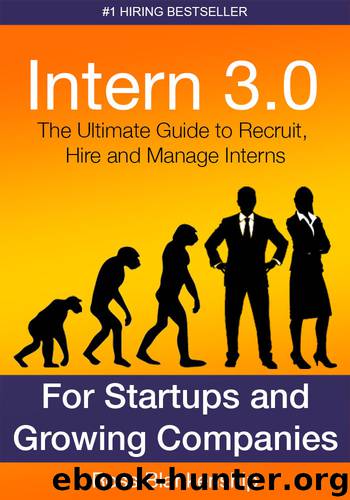Intern 3.0: The Ultimate Guide to Recruit, Hire, and Manage Interns for Startups and Growing Companies by Ross Blankenship

Author:Ross Blankenship [Blankenship, Ross]
Language: eng
Format: epub
Published: 2014-08-11T04:00:00+00:00
How to Read a Résumé
“The Résumé Roadmap”
When you're hiring Johnny Appleseed, your eyes should be directed toward these sections. If the résumé isn't designed like the ideal résumé above, then you should still search and find these in the same order of importance.
As a general point, résumés for the most part are worthless (but they're not going anywhere, anytime soon.) You have to take much of the crafty adjectives and extracurriculars, and boil them into the parts above—always focusing on skills and actual accomplishments more than where someone went to college or how you spell his or her name. Focus on the big picture! We're reinventing the way people are hired at StudyHall, but be patient because corporate America is still making the same mistakes by focusing on the wrong sections of résumés.
Whether somebody goes to Harvard University, a state university or a vocational school, I want to know what the applicant learned there, and how she’s going to apply practical skills to my company.
I’m not talking about hobbies like underwater basket weaving or Pottery 101. Whether I am a startup of a Fortune 500 company, I need to know what an applicant’s core skills are and whether she can work with other people.
When analyzing a résumé, you need to understand what is important to your company. Erase this traditional idea of reading a résumé from left to right, top to bottom. Instead, hit the gas and go right to skills. That is what matters most.
The next things that stand out to me when I read a résumé are action verbs, such as create, build, enhance and design. These words signify that an applicant is capable of working and thinking on her own. I also like definitive metrics. If I’m looking for a blogger, I love being shown how an applicant increased a blog’s readership by fifty percent! Wouldn’t that stand out to you, too? And I like to see actual numbers, not some useless information telling me about what they did. It’s about showing me what you have done, not just telling me about it.
Third, I like to see an applicant who has been somewhere. Of course, when we are talking about interns and new hires, this is challenging. College students and recent graduates have yet to really build up a résumé. They have not stayed in the same place for five or 10 years. But I don’t like seeing someone who has jumped around every three months from internship to internship, yet tells me what a great employee they have been. Really? If that was the case, why didn’t any of her employers keep her on board after? Even if these were unpaid internships, if she did a great job, companies would have kept her around.
I also like to see someone who is working throughout the school year and earning a paycheck. These applicants often have great work ethic, as they understand balancing their studies against their need to earn money. I like seeing work experience and people who are used to putting in overtime.
Download
This site does not store any files on its server. We only index and link to content provided by other sites. Please contact the content providers to delete copyright contents if any and email us, we'll remove relevant links or contents immediately.
Bad Blood by John Carreyrou(6585)
Rich Dad Poor Dad by Robert T. Kiyosaki(6517)
Principles: Life and Work by Ray Dalio(6299)
Playing to Win_ How Strategy Really Works by A.G. Lafley & Roger L. Martin(6092)
Management Strategies for the Cloud Revolution: How Cloud Computing Is Transforming Business and Why You Can't Afford to Be Left Behind by Charles Babcock(4550)
The Confidence Code by Katty Kay(4222)
Thinking in Bets by Annie Duke(4186)
American Kingpin by Nick Bilton(3822)
Delivering Happiness by Tony Hsieh(3397)
Project Animal Farm: An Accidental Journey into the Secret World of Farming and the Truth About Our Food by Sonia Faruqi(3192)
The Power of Habit by Charles Duhigg(3097)
The Tyranny of Metrics by Jerry Z. Muller(3032)
Brotopia by Emily Chang(3029)
Mastering Bitcoin: Programming the Open Blockchain by Andreas M. Antonopoulos(3015)
The Marketing Plan Handbook: Develop Big-Picture Marketing Plans for Pennies on the Dollar by Robert W. Bly(3008)
I Live in the Future & Here's How It Works by Nick Bilton(2963)
The Content Trap by Bharat Anand(2889)
Applied Empathy by Michael Ventura(2865)
Building a StoryBrand by Donald Miller(2865)
